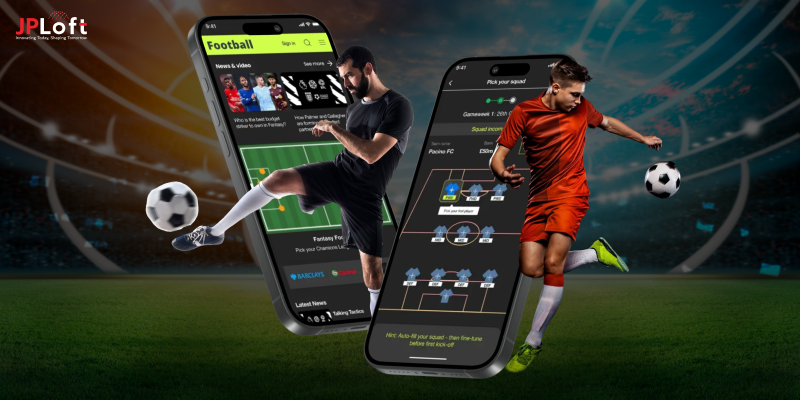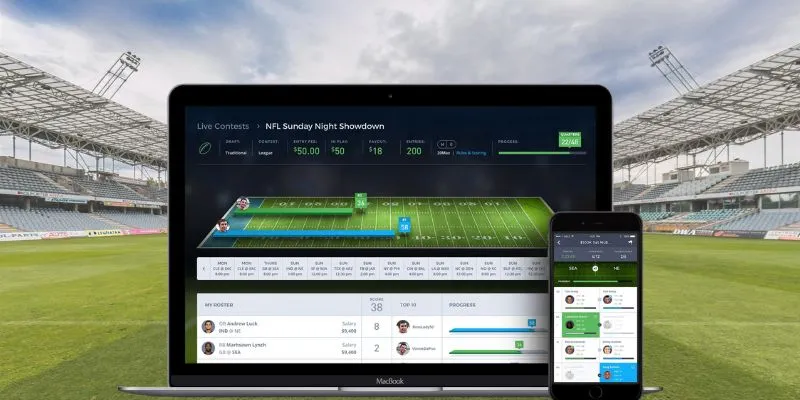The world of technology and sports has recently seen a remarkable convergence regarding integrating Artificial Intelligence (AI) to create fantasy sports. Fantasy sports, a trend that has won the hearts of sports fans worldwide, involve players assembling virtual teams of real athletes and competing based on their actual on-field performance. Thanks to AI's incorporation into the equation, a new age of excitement and engagement has begun and is fundamentally changing the face of the Fantasy Sports market.
Artificial intelligence has found its place with fantasy app development company through the crunching of numbers and providing extensive change. By analyzing vast information, AI algorithmic models give highly accurate predictions and insight that influence strategies for in-game play and team choices. The dynamic interplay of AI and sports stats has been crucial in increasing the authenticity of video games based on sports, making integrating AI with fantasy sports sites a natural and exciting step.
What is Machine Learning?
You must’ve heard of the term Machine Learning mixed with fantasy sports solutions before. It's a buzzword, and it can be scary. The math behind these algorithms can become quite complicated. However, the application algorithm in Python with a library referred to as sklearn is pretty simple.
Typically, a computer program is a series of instructions you explicitly define for the computer/server/whatever to run, and it just does it - assuming you told it correctly how to do what it needs to do (you used proper syntax).
ML is, however, a great option because its algorithms enable computers to accomplish tasks based upon previous data without having explicit guidelines on how to make these predictions. It accomplishes this through learning or "training" prior data.
In addition, machine learning algorithms can generally be classified into two groups: supervised or unsupervised. Supervised ML algorithms learn from labels, whereas unsupervised algorithms don't require labels (and are usually employed to create labels for algorithms with supervised learning). Learning with labels is the algorithm learning by taking in a feature matrix, traditionally referred to as X. It also incorporates a target array, usually identified by y, and attempts to find ways of describing how the features matrix is related to the variety. The algorithm created is the one it is trying to understand. We can then use data with no labels and apply our new algorithm to determine a new label for the data we haven't seen.
Unsupervised and supervised machine learning algorithms are broken down further.
The unsupervised algorithm can be divided into clustering algorithms and algorithms to reduce dimensionality. Clustering algorithms seek to identify different groups in a set. Dimensionality reduction algorithms are designed to discover a less dimensional representation of a vast dataset while preserving some of the fundamentals in the data source (essentially seeking a less cluttered representation).
For the supervised algorithms, we have the regression and classification algorithms. Regression algorithms forecast an unidirectional value, which can be a number that covers any period, such as the Fantasy sports point. Classification algorithms attempt to determine the class to which the input belongs. There are numerous regression and classification algorithms we cannot cover. We'll start with the most basic, simple Linear Regression. Then, we'll proceed toward Multiple Linear Regression, and after that, we will add regularization to our model using cross-validation.
There are currently three kinds of machine learning techniques:
Supervised Learning
In this method, the human gives the algorithm examples of the desired outcome it is expecting to achieve, such as the actual value of a house's sale. The algorithm then teaches itself by comparing the predictions with the actual outcomes to find flaws and adjust the model accordingly. Once trained, a great model can provide valuable predictions regarding previously unknown data. It is sensible to utilize supervised learning to predict goals for models because it is possible to develop models by providing data to fantasy app development company about whether a shot produced an actual goal.
Unsupervised Learning
As the name implies, this learning method is presented with unlabelled data and is left to determine connections between the inputs on its own. The most common application of this model is to categorize people according to their purchase patterns to help them identify what they may be interested in purchasing in the near future. This method is proper when you have a large dataset with many features and it's unclear which patterns you're trying to find.
Reinforcement Learning
The machine is rewarded with an incentive function and learns by trial and error to increase the reward. Whatever method is used for creating models, the steps to build an excellent model of machine learning are like this:
-
-
Get some data
-
Cleanse the data
-
Choose a modeling strategy
-
Feature engineering
-
Model the training
-
Examine the model
-
Adjust the model's parameters to increase your model's performance.
-
Make predictions for the end of the day.
-
The following articles and others will explain each aspect of the above.
How AI Can Help Make Fantasy Sports More Fun?
The sound of the fans, the bang of helmets, the thrill of a touchdown, and the excitement of winning football have won many fans. In the absence of screens and stadiums, an equally important game is taking place in the world of fantasy sports solutions. A virtual arena where you can't only play for teams but also manage your own, it's an exciting experience. AI is transforming the world of fantasy sports in an unprecedented way.
AI Can Make Fantasy Sports More Simple
The essence of fantasy sports solutions is the complexity. Determining who to draft, selecting your team for a particular week, and dealing with the bye and injury weeks requires understanding the game and, most crucially, evaluating information. Many people spend hours studying the latest statistics, reading analyses by experts, and watching games in order to gain an edge. However, despite all that work, the sheer volume of data and variables can be overwhelming.
That's where AI can help to be a total game changer. AI technology can analyze massive data sets in real-time and provide information that an analyst with human skills would take several hours or days to gather. By performing the heavy lifting in data analysis, AI lets players concentrate on social interaction and strategy and enhances players' overall experiences.
AI Can Transform Stats Into Recommendations
Statistics are the backbone of fantasy sports solutions. From the number of yards gained to touchdowns, every move on the field can be translated into points for the fantasy world. The trick is understanding how these numbers' meanings relate to them. AI provides a significant benefit. The sophisticated algorithms can discern patterns, trends, and other indicators that aren't immediately apparent to the human eye.
Think of an artificial intelligence system that could inform you that a particular running back performs very well when playing on grass fields and not so much on a turf field. These granular data could be gold for deciding your team's starting lineup. The power of computation in AI combined with sophisticated analytics can transform the raw data into actionable suggestions that significantly improve your decision-making process.
The key to driving the AI revolution in software for fantasy football is the idea of "the Fantasy Bot. Imagine a mix of an elite sports analyst, a well-trained football coach, and a data scientist. This bot isn't just a source of information but provides specific, actionable information tailored to each team or league.
Let's say that two managers in your league have traditionally played in close matches, in which less than 5 points have often won. The Fantasy Bot could highlight this rivalry during the lead-up to the game, creating anticipation.
Additionally, if a supervisor has a lineup problem caused by injuries, the program will suggest the best replacements, not solely based on their current performances but also by looking at how specific replacements have performed against their upcoming opponent.
AI Amps Up Predictive Analysis
The real power of AI is its ability to predict. Modern AI systems utilize machines that take in the past to make future predictions.
These technologies go far beyond traditional variables such as the player's stats or weather conditions. They may include less tangible variables like player morale or injuries, as well as locker-room dynamics, to predict a player's future performance. This can add an entirely new level of excitement and sophistication to the world of fantasy sports.
AI Boosts Social Interactions
Fantasy sports are not only about winning. They're about having fun, chatting, and bonding over a shared passion for the sport. AI can help in this regard, too. Modern natural language processing algorithms can create talk points, trivial questions, and even fun insults that managers can employ to interact with their fellow league members. AI can enhance the social aspect associated with fantasy sports solutions, thereby making the game more engaging and enjoyable.
AI Levels the Experience Field
It is possible to think that using AI can make the game less complicated for veterans who have played it before. But, the reality is that the reverse is true. At the same time, AI may help beginners better understand its intricacies, but it can also be a potent tool for skilled players. AI algorithms could test conventional wisdom, give new perspectives, and provide experienced players fresh ways to think about strategies.
AI Augments Human Decision-Making
The goal of using AI in software for fantasy football isn't to substitute human decision-making but to improve it. By providing a wide array of information-driven suggestions and data-driven insights, AI enables players to make better-informed choices.
However, the final decision remains in the hands of a human who can bring in the aspects of intuition, risk-taking, and emotional intelligence that machines can't duplicate. This results in a harmonious AI-human relationship that propels the game to new levels.
For sure, as AI becomes more immersed in fantasy sports, moral concerns will come up. From concerns about data privacy to the appropriate application of AI tools, guidelines are needed to ensure technology can be used as an enhancement instead of a disruptive force. Like any technological advancement, it is essential to have a balanced method that is mindful of the nature of the game and the possibilities of technology.
Future Sports Fantasy Landscape Industry Based on Artificial Intelligence
As the world of fantasy sports evolves, the integration with Artificial Intelligence (AI) is set to play a significant part in shaping the future direction. Today, AI's impact is just the beginning of the iceberg. Many exciting possibilities in the future will redefine the user experience, broaden the options for playing, and improve the level of engagement with fans. This article explores the future of the fantasy sports industry and the relationship between AI and fantasy app development company.
Hyper-Personalized Experiences
The future of fantasy sports lies in hyper-personalization, where AI tailors the experience to individual preferences and play styles. AI algorithms analyze players' past choices, game behaviors, and real-time responses to refine suggestions and recommendations. This kind of personalization makes for an incredibly immersive experience, making it easier to connect fans with their virtual team.
Enhanced Realism by AR as well as VR Integration
AR and VR technology hold immense potential to bring people closer to what's happening. Imagine a scenario in which fans could visit a virtual stadium, play with their team of choice in real-time, and observe the game from multiple perspectives. AI is at the heart of this experience and seamlessly integrates player data and game-related statistics into the virtual space, adding a new dimension to the fan's engagement.
Dynamic Game Formats and Challenges
AI's flexibility will enable the creation of new game types geared towards players' ever-changing needs. AI-powered games could be adapted to different skill levels and preferences, ensuring players remain entertained. Interactive stories, adaptive difficulty levels, and constantly changing competitions will keep the games exciting, fresh, and appealing to a wider variety of users.
Proactive Injury Management and Strategy
AI's predictive abilities will improve to provide more accurate injury forecasts and their potential impact on player performance. Users will be able to get real-time information on the risk of injury and suggestions for lineup changes that are strategically planned. This proactive approach ensures that fantasy players are able to deal with the complexities of injuries, increasing their team's competitive advantage.
Enhanced Player Engagement for All Ages
Integrating AI can help make sports fantasy more convenient and enjoyable for players of all ages. AI-powered tutorials and interfaces that are simple and easy to follow Guidance can attract new players while retaining the interest of experienced players. This diversity will lead to an active and diverse community of fantasy sports.
Ethical AI Implementation
As AI's influence grows, ethics will become more crucial. Future trends in the AI industry will insist on ethical AI implementation, including addressing biases, ensuring transparency, and focusing on users' well-being. Platforms that promote ethical AI can build trust with users and help ensure the industry's growth over time.
Role of AI in the Fantasy Sports Industry
The effect of Artificial Intelligence (AI) within the world of fantasy sports is vast and continues to grow. From data analysis to user interaction, AI provides many tools and capabilities that have dramatically improved the experience of both players as well as the platform provider. Here are a few of AI's critical functions in this field:
Predictive Analytics:
-
-
Predictions of Player Performance: AI models can use massive historical data to determine the individual performance of players for the upcoming games. This includes estimates on touchdowns, points, assists, and other metrics the fantasy sports solutions.
-
-
-
Assessment of Injury Risk: By analyzing information on physical health, past injuries, and recent performance, AI can project the danger of possible injuries. This is vital for players to select their rosters for the coming games.
-
Optimized Lineup Creation:
-
-
Recommendation Systems: Machine-learning models study past games, player statistics, and even team tactics to determine the most optimal lineup for an individual. This is particularly useful for novices who may be required to learn about the sport in depth.
-
-
-
Risk-Reward Analysis using AI: AI can provide insight into the risks and benefits of selecting certain players, allowing players to make educated decisions according to their game strategy.
-
Personalized User Experience:
-
-
Tailored Content Delivery: AI algorithms study a user's behavior and preferences to show customized news player updates, news, and match-related information to ensure that the user is presented with relevant information.
-
-
-
Lerner Behaviors and Patterns of Learning: It is able to recognize users' preferences and patterns over time and keeps improving and refining the personalized experience.
-
Chatbots and Assistance:
-
-
Instant Answer to Query: AI-powered chatbots can respond instantly to user inquiries, ranging from simple questions regarding gameplay to more complicated questions about player statistics.
-
-
-
Instructions and Guidance for Newcomers to Fantasy Sports: AI-powered virtual assistants can offer instructions, game strategies, and other tips, helping to increase the user's onboarding experience and retention.
-
Enhanced Game Dynamics and Realism:
-
-
Simulating Real-world Scenarios: Using Artificial Intelligence (AI),fantasy app development company can more accurately simulate real-world scenarios, which makes the experience more authentic.
-
-
-
Variable dynamics: Variable dynamics are based on real-world situations, such as an abrupt change in a player's appearance or sudden events. AI can alter game dynamics instantaneously, providing players with an ever-changing gaming experience.
-
AI is the core of the latest software for football fantasy, increasing realism, user engagement, and decision-making capabilities. It connects vast data on sports and the user, making the game more engaging and logical.
Conclusion
The program created to provide machine-learning predictions for 2020's software for fantasy football season gives a unique and objective perspective on players' performance. The program produces accurate forecasts for the coming season by utilizing comprehensive data analysis and incorporating averages from career and previous season stats. This technique eliminates biases based on human nature and provides fantasy sports solutions with helpful information to help them make educated decisions.
Fantasy sports are gaining traction, and AI is helping players become more adept at their game. They are using AI to win bigger profits and enjoy an immersive experience that aligns with their goals and preferences. AI is being utilized to develop apps for fantasy sports by the fantasy sports app development company, and the players benefit from predictive analytics, data analysis, and real-time advice.












Share this blog